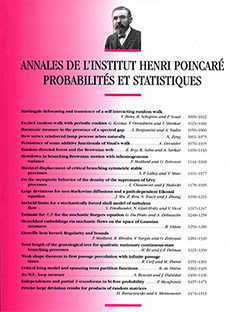Abstract
In this article integro-differential Volterra equations whose convolution kernel depends on the vector variable are considered and a connection of these equations with a class of semi-Markov processes is established. The variable order $\alpha(x)$-fractional diffusion equation is a particular case of our analysis and it turns out that it is associated with a suitable (non-independent) time-change of the Brownian motion. The resulting process is semi-Markovian and its paths have intervals of constancy, as it happens for the delayed Brownian motion, suitable to model trapping effects induced by the medium. However in our scenario the interval of constancy may be position dependent and this means traps of space-varying depth as it happens in a disordered medium. The strength of the trapping is investigated by means of the asymptotic behaviour of the process: it is proved that, under some technical assumptions on $\alpha(x)$, traps make the process non-diffusive in the sense that it spends a negligible amount of time out of a neighborhood of the region $\operatorname{argmin}(\alpha(x))$ to which it converges in probability under some more restrictive hypotheses on $\alpha(x)$.
Dans cet article, les équations de Volterra intégro-différentielles dont le noyau de convolution dépend de la variable vectorielle sont considérées et une relation entre ces équations et une classe de processus semi-Markoviens est établie. L’équation de diffusion fractionnelle d’ordre variable $\alpha(x)$ est un cas particulier de notre analyse et elle se révèle être associée à un changement de temps approprié (non indépendant) du mouvement Brownien. Le processus résultant est semi-markovien et ses trajectoires ont des intervalles de constance, comme cela arrive pour le mouvement Brownien retardé, adapté pour modéliser les effets de piégeage induits par le milieu. Cependant, dans notre scénario, l’intervalle de constance peut dépendre de la position et cela signifie des pièges de profondeur variant dans l’espace comme cela se produit dans un milieu désordonné. La force du piégeage est étudiée au moyen du comportement asymptotique du processus: il est démontré que, sous certaines hypothèses techniques sur $\alpha(x)$, les pièges rendent le processus non diffusif en ce sens qu’il passe un temps négligeable hors d’un voisinage de la région $\operatorname{argmin}(\alpha(x))$ vers laquelle il converge en probabilité sous quelques hypothèses plus restrictives sur $\alpha(x)$.
Citation
Mladen Savov. Bruno Toaldo. "Semi-Markov processes, integro-differential equations and anomalous diffusion-aggregation." Ann. Inst. H. Poincaré Probab. Statist. 56 (4) 2640 - 2671, November 2020. https://doi.org/10.1214/20-AIHP1053
Information





